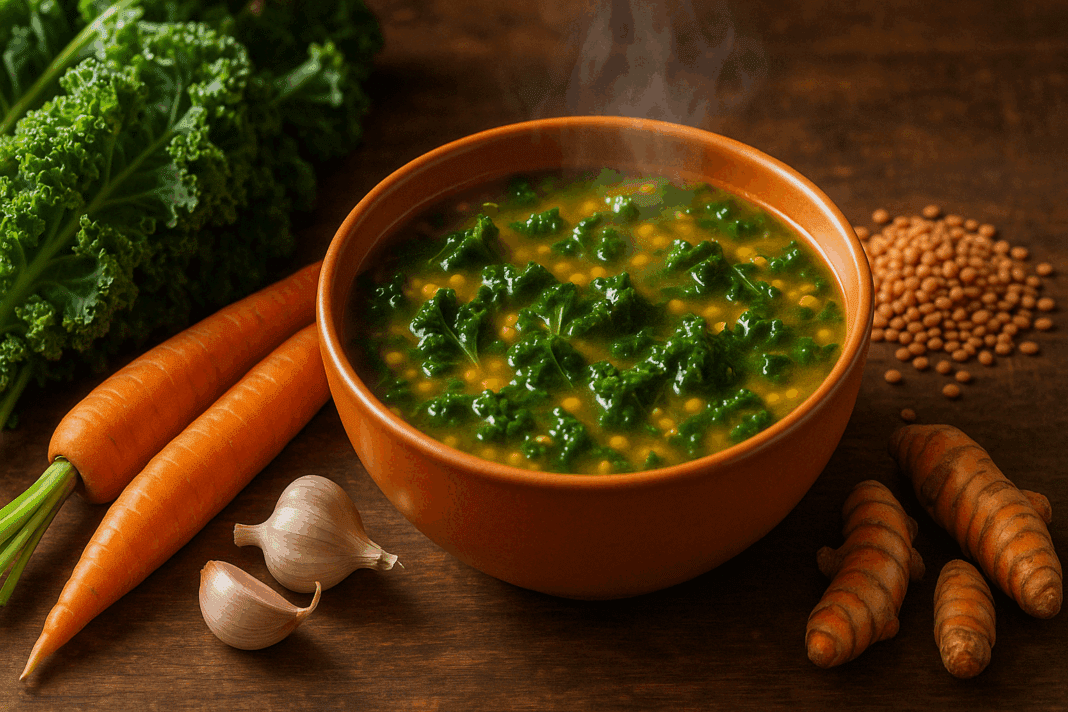In today’s health-conscious culture, where plant-based nutrition is gaining traction not merely as a trend but as a long-term lifestyle, the humble bowl of soup has reemerged as a cornerstone of whole-food wellness. Among the many varieties of health-promoting soups, vegan kale soup recipes stand out for their vibrant nutrient profile, versatility, and deep-rooted connections to traditional healing practices. Kale, a cruciferous leafy green rich in vitamins, minerals, and antioxidants, plays the starring role in these immune-supportive dishes. Its compatibility with a wide array of legumes, root vegetables, and spices allows for endless culinary creativity while remaining firmly anchored in the principles of plant-based health.
You may also like: Healthy Plant-Based Dinners Made Easy: Best Whole Food Plant-Based Recipes for Beginners and Beyond
What distinguishes vegan kale soup from other plant-based meals is its unique ability to simultaneously comfort and fortify the body. Unlike ultra-processed vegan substitutes or soy-heavy entrees that sometimes lack whole-food integrity, a well-crafted vegan soup with kale delivers a synergistic blend of fiber, phytonutrients, and essential micronutrients without sacrificing flavor. For those seeking an immune boost during flu season or aiming to enhance long-term resilience through nutrition, these soups offer a practical, evidence-informed solution grounded in both culinary tradition and modern science.
The Nutritional Power of Kale in Vegan Soups
Kale’s nutritional value is nothing short of extraordinary. A single cup of raw kale contains over 100% of the recommended daily intake of vitamin K, an essential nutrient for blood clotting and bone metabolism. It is also rich in vitamin A (in the form of beta-carotene), which supports eye health and immune defense, as well as vitamin C, known for its role in enhancing the activity of immune cells and supporting collagen production. When simmered gently in soup, kale retains much of its nutritional value, especially when not overcooked. This makes vegan kale soup recipes an optimal choice for those seeking immune support without relying on synthetic supplements.
In addition to vitamins, kale provides significant amounts of manganese, calcium, and potassium, all of which contribute to metabolic and muscular functions. Its antioxidant profile includes quercetin and kaempferol, flavonoids that have been studied for their anti-inflammatory and heart-protective effects. Moreover, kale’s sulfur-containing compounds, such as glucosinolates, play a role in detoxification processes by supporting liver enzyme function. These compounds are more bioavailable when kale is lightly cooked, as in the case of vegan soup kale recipes, which gently release these phytochemicals into the broth, making them easier for the body to absorb.
Kale also contributes a robust dose of fiber, aiding digestive health and supporting a diverse gut microbiome. A healthy gut has been increasingly recognized as essential to immune regulation, as approximately 70% of the immune system resides in the gastrointestinal tract. Therefore, consuming high-fiber meals such as vegan kale soup not only supports satiety and digestive regularity but may also help modulate immune responses through gut-mediated mechanisms. This connection between kale, digestion, and immunity is a compelling reason to incorporate it regularly into a whole-food, plant-based diet.
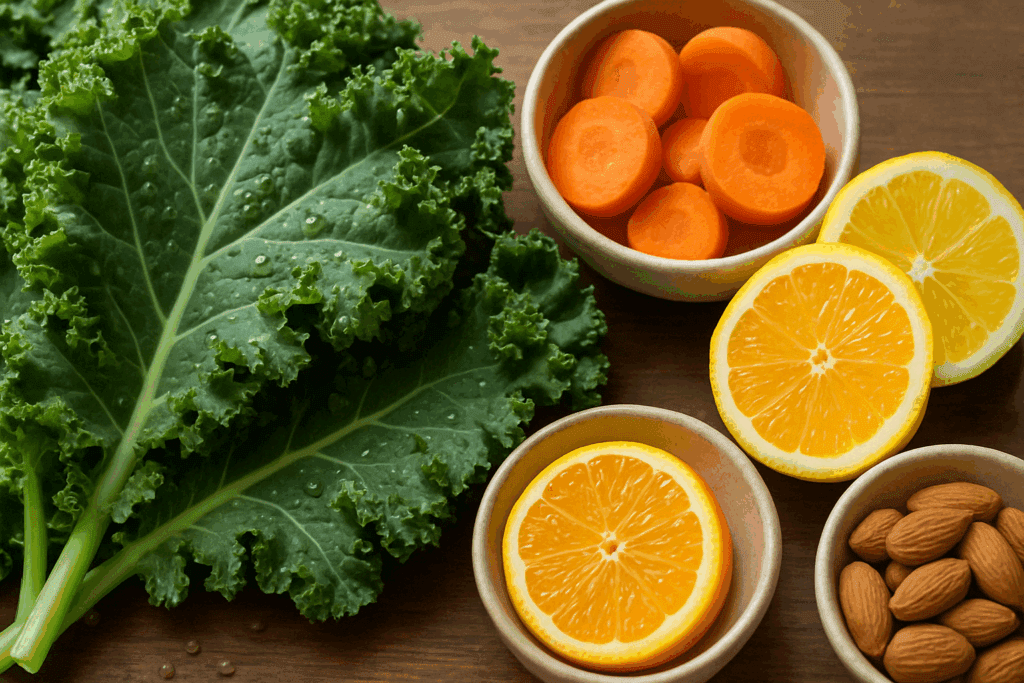
Immune-Supporting Ingredients to Enhance Vegan Kale Soup
While kale may be the central nutrient-dense star, it is the supporting ingredients that round out the health benefits and flavor profile of a truly healing vegan soup kale experience. Garlic, for instance, has been celebrated for centuries as a natural immune booster due to its content of allicin, a sulfur compound with antimicrobial and antiviral properties. Including fresh garlic in the sauté base of your soup not only enhances the aroma and depth but also introduces active plant compounds known to stimulate immune cells and reduce inflammation.
Ginger is another potent addition, often paired with garlic for its warming and anti-inflammatory effects. Its bioactive component, gingerol, has been shown in studies to inhibit inflammatory pathways and support digestion, making it an excellent ingredient for soothing the gastrointestinal tract while bolstering the immune response. Turmeric, with its bright golden hue, further contributes to this trifecta of immune-enhancing roots. Curcumin, turmeric’s most studied compound, exhibits antioxidant activity that may help modulate immune responses and protect against oxidative stress.
Legumes such as lentils and chickpeas offer an excellent source of plant-based protein, iron, and zinc—micronutrients that are critical for immune function and commonly monitored in vegan diets. Unlike animal-based sources of these nutrients, legumes contribute no saturated fat and are rich in fiber, making them particularly compatible with whole-food plant-based nutrition goals. Adding these to vegan kale soup recipes not only adds bulk and texture but also enhances the overall nutrient density in a synergistic way.
Root vegetables like sweet potatoes, carrots, and parsnips bring natural sweetness and a wide array of carotenoids, which are precursors to vitamin A. These compounds play a vital role in mucosal immunity, the body’s first line of defense against pathogens. Their starchy texture also provides a satisfying base that complements the chewiness of kale and legumes. Combined with a broth made from simmered onions, celery, herbs, and perhaps a splash of apple cider vinegar to enhance mineral absorption, these ingredients culminate in a truly nourishing, immune-supportive vegan soup kale ensemble.
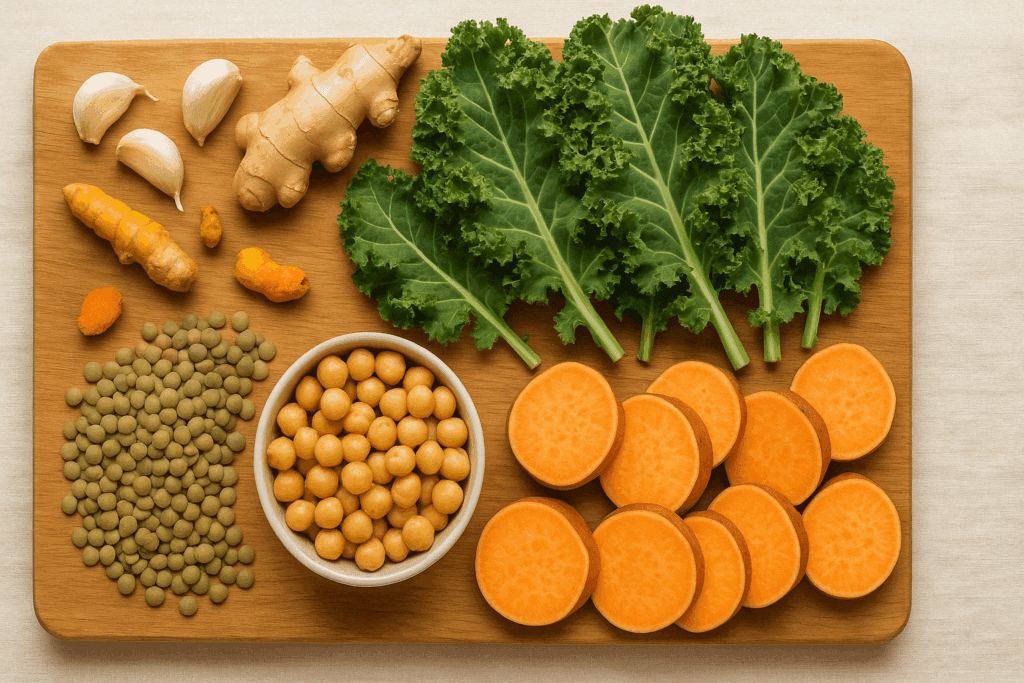
Crafting the Perfect Vegan Kale Soup Recipe: Culinary Considerations
Developing a memorable and nourishing vegan kale soup recipe requires more than throwing ingredients into a pot. It is an exercise in balancing flavors, textures, and nutrient synergy. The foundation typically begins with a mirepoix of onions, carrots, and celery, gently sautéed in extra virgin olive oil or water for oil-free versions. This aromatic base not only enhances flavor but also contributes prebiotic compounds that feed beneficial gut bacteria.
Choosing the right broth is another essential step. For those adhering strictly to a whole-food plant-based regimen, homemade vegetable broth offers a clean and customizable option free from additives. Incorporating kombu, a mineral-rich sea vegetable, into your broth can enhance its umami depth while providing iodine—an essential nutrient sometimes lacking in vegan diets. For convenience, low-sodium store-bought broths can also serve as a base, but it’s worth checking ingredient labels for added sugars, preservatives, or artificial flavorings.
Once your broth is prepared, layering in legumes, grains, and seasonal vegetables will provide diversity in flavor and nutritional benefit. Brown rice, barley, or quinoa can be added early in the simmering process to provide slow-releasing complex carbohydrates. Later, add in chopped kale and softer ingredients like zucchini or green beans, which require less cooking time to preserve texture and color. A final touch of lemon juice or vinegar at the end brightens the dish and aids in mineral absorption, especially iron.
Spices should not be overlooked. In addition to turmeric, cumin and coriander add earthy complexity, while smoked paprika or chipotle powder can lend a subtle heat that complements the natural bitterness of kale. A pinch of black pepper enhances curcumin absorption, making it a must when using turmeric. The balance of herbs and spices in a vegan kale soup recipe can transform a simple meal into a sensorial experience that supports both taste and immunity.

Seasonal Variations of Vegan Soup Kale Recipes for Year-Round Wellness
One of the most appealing aspects of vegan kale soup recipes is their adaptability to seasonal produce, which supports both sustainability and nutritional variety. In autumn, roasted squash and kale soup can provide warmth and grounding, utilizing butternut or acorn squash for their silky texture and beta-carotene richness. Adding a touch of nutmeg or cinnamon can elevate the earthy sweetness while contributing subtle antimicrobial properties.
During winter, heartier legumes like black beans and red lentils pair beautifully with kale, garlic, and warming spices such as clove and allspice. These winter versions of vegan soup kale not only offer comfort against the cold but deliver immune-reinforcing nutrients at a time when colds and respiratory infections are more prevalent. Adding fermented elements like miso or a dash of tamari can further enhance umami flavor and introduce beneficial probiotics if added at the end of cooking.
Spring invites lighter, detoxifying ingredients. Think asparagus, peas, and lemon zest alongside kale for a bright and energizing soup. These ingredients help support liver function and cellular renewal, making springtime vegan kale soup recipes particularly refreshing and restorative. Herbs such as dill, parsley, and chives add not only flavor but phytonutrients that support cardiovascular and immune function.
In the summer months, a chilled kale and cucumber soup seasoned with mint and lime offers a cooling alternative. While not a traditional warm soup, it fits perfectly into the broader category of vegan kale soup recipes that nourish without overheating the body. Blending raw kale with avocado, chilled broth, and hydrating cucumbers creates a raw yet satisfying dish that keeps immunity supported through antioxidants and healthy fats.
Rotating ingredients based on seasonal availability not only enhances flavor and nutrition but ensures dietary diversity—a key factor in supporting a healthy gut microbiome and, by extension, a robust immune system. This dynamic approach to vegan soup kale recipes reflects the rhythm of nature while reinforcing the health benefits that come from varied whole-food intake.
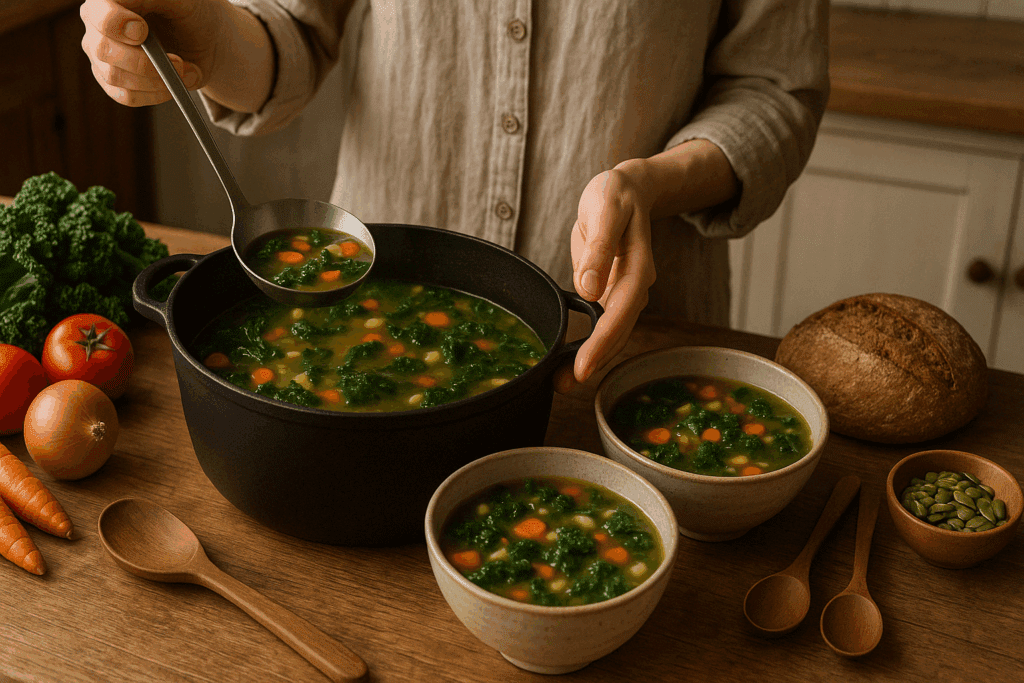
Why Vegan Kale Soup Supports Whole-Food Plant-Based Living
At its core, whole-food plant-based nutrition emphasizes minimally processed foods derived from plants, focusing on their inherent nutrient density rather than relying on supplements or heavily engineered substitutes. Vegan kale soup recipes perfectly embody this philosophy. They utilize unrefined ingredients in their natural form and harness the healing potential of plants through synergistic combinations of vitamins, minerals, antioxidants, and fiber.
Beyond their nutritional profile, these soups align with the lifestyle values of mindfulness, sustainability, and ethical eating. Choosing local, organic vegetables and legumes for soup preparation not only minimizes environmental impact but supports regenerative farming practices. For many adherents of plant-based living, this integration of personal health with planetary stewardship is a motivating factor in choosing meals that reflect both values and vitality.
Moreover, the simplicity of preparation fosters consistency. Unlike more elaborate plant-based meals that require specialty ingredients or complex techniques, vegan kale soup can be made in large batches and stored for multiple meals. This accessibility encourages adherence to whole-food eating patterns, even for those with demanding schedules. It also allows for family-style sharing, reinforcing communal and cultural connections around nourishing food.
On a physiological level, the high fiber content in vegan kale soup supports satiety and stabilizes blood sugar, making it a strategic choice for individuals managing weight or blood glucose levels. The absence of cholesterol and saturated fat further supports cardiovascular health. For those transitioning from a Standard American Diet, incorporating vegan soup kale into their weekly routine offers a gentle yet effective introduction to the transformative benefits of plant-based nutrition.
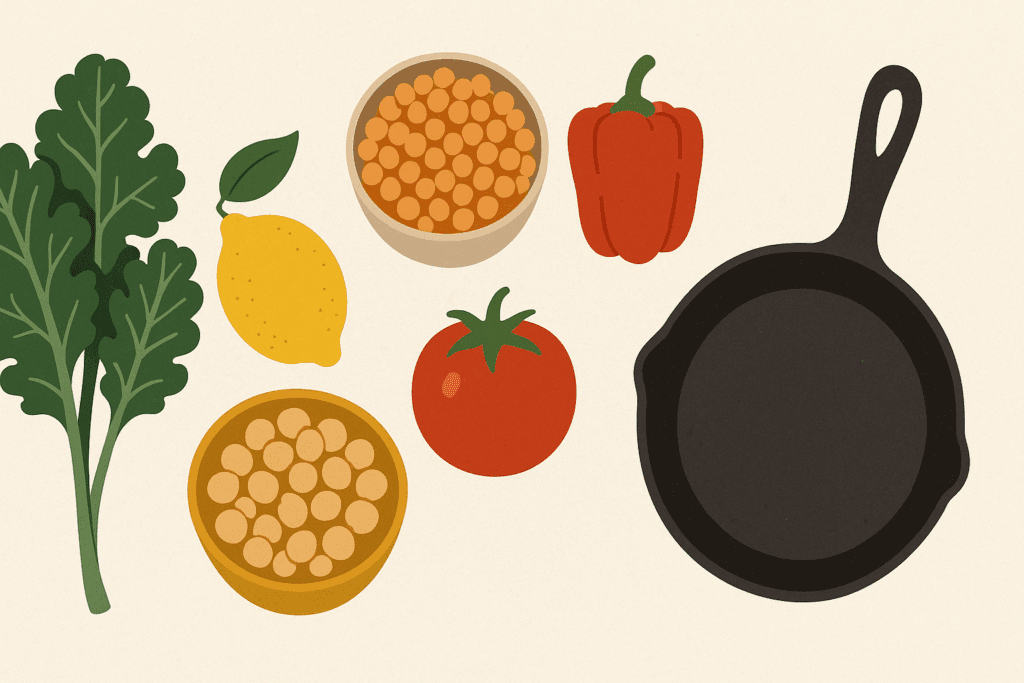
Frequently Asked Questions: Nutrient-Packed Vegan Kale Soup Recipes
1. Can I freeze vegan kale soup without losing its nutritional value or texture?
Yes, vegan kale soup recipes are generally freezer-friendly, making them a great choice for batch cooking and meal prep. However, freezing can affect the texture of certain ingredients, particularly kale, which may become softer or slightly mushy after thawing. To mitigate this, consider blanching the kale before adding it to the soup or adding fresh kale when reheating frozen portions. Nutritionally, most vitamins and minerals in vegan soup kale remain stable during freezing, especially fat-soluble vitamins like A and K. For best results, cool the soup completely before freezing and use airtight containers to prevent freezer burn and nutrient degradation.
2. What are some lesser-known greens that can complement or substitute kale in vegan soup kale recipes?
While kale is central to many vegan kale soup recipes, other leafy greens can complement or even temporarily replace it for variety and added nutritional nuance. Options like Swiss chard, mustard greens, dandelion greens, or tatsoi each bring their own phytonutrient profiles and flavors. For example, dandelion greens offer a mild bitterness and are rich in prebiotic fibers that feed healthy gut bacteria. Swiss chard adds a touch of sweetness and works particularly well in tomato-based vegan soup kale versions. Rotating different greens helps diversify your micronutrient intake and may support a more robust immune response through improved gut flora diversity.
3. How can I enhance the absorption of iron from vegan kale soup recipes?
Iron absorption from plant-based sources like kale can be influenced by the presence of vitamin C and the absence of inhibitors such as calcium or tannins. To increase bioavailability, pair your vegan kale soup recipes with ingredients like lemon juice, bell peppers, or tomatoes, all of which are rich in vitamin C. Adding citrus juice at the end of cooking helps preserve this heat-sensitive vitamin. Avoid pairing iron-rich vegan soup kale with calcium-rich foods like fortified plant milks during the same meal, as calcium can compete for absorption. Cooking in cast iron pots can also modestly boost the iron content of your soup, offering a subtle yet cumulative benefit over time.
4. Are there specific types of kale that work better in vegan soup kale preparations?
Yes, the type of kale you use can significantly influence the flavor and mouthfeel of vegan kale soup recipes. Lacinato kale, also known as dinosaur kale, is particularly well-suited for soups due to its tender leaves and slightly sweet, nutty flavor. Curly kale, while more widely available, can be tougher and may require longer cooking to soften properly. Red Russian kale is another variety worth exploring; it offers a milder taste and vibrant color that enhances visual appeal. For raw or minimally cooked vegan soup kale recipes, baby kale is an excellent choice due to its delicate texture. Experimenting with these different varieties allows you to tailor your soup’s profile to suit personal taste or seasonal availability.
5. What are some advanced flavor layering techniques to elevate vegan kale soup recipes?
To elevate vegan kale soup recipes beyond basic seasoning, focus on building complexity through layers of umami, acidity, and aromatic depth. Start by sautéing aromatics like leeks, fennel, or shallots with a pinch of salt to draw out moisture and intensify sweetness. Incorporate fermented elements like miso paste, nutritional yeast, or tamari to deepen the umami profile. Adding acid toward the end—such as white wine vinegar or preserved lemon—helps brighten the soup and balance richness. Toasting spices like cumin, coriander, or mustard seeds before adding them can unlock their full aromatic potential. These techniques enrich vegan soup kale with sophisticated flavor dimensions typically found in high-end culinary settings.
6. Can vegan kale soup recipes support recovery during or after illness?
Absolutely. Vegan kale soup recipes can be tailored specifically to support immune recovery by incorporating ingredients that soothe inflammation and replenish nutrients. During recovery, the body requires easily digestible foods rich in vitamins A, C, zinc, and antioxidants. Including ingredients like turmeric, garlic, and ginger adds anti-inflammatory support, while soft textures from well-cooked legumes and grains reduce digestive strain. Vegan soup kale variations that use pureed vegetables, such as carrots or squash, can be particularly soothing for sore throats or reduced appetite. Hydration is another benefit, as broth-based soups contribute fluids and electrolytes, making them ideal for gentle nourishment during convalescence.
7. How can vegan soup kale recipes align with global culinary traditions?
Vegan kale soup recipes offer a remarkably flexible canvas for exploring international flavors while preserving whole-food, plant-based principles. Mediterranean-style versions may include oregano, olives, and chickpeas, while West African variations might feature ground peanuts, okra, and yams. For an Indian twist, consider using lentils, curry leaves, and cumin to develop rich, earthy notes that blend beautifully with kale. East Asian-inspired vegan soup kale can incorporate ingredients like shiitake mushrooms, miso, and bok choy for a warming umami experience. These global adaptations not only expand your flavor palette but also introduce new phytonutrients and traditional wellness practices tied to each region’s cuisine.
8. What are the psychological or emotional benefits of eating vegan kale soup regularly?
Beyond its physical health advantages, regularly consuming vegan kale soup can have subtle but meaningful psychological and emotional benefits. Warm, nourishing soups are often associated with comfort and care, which can help reduce stress and foster a sense of emotional well-being. Preparing vegan soup kale from scratch can also become a form of mindfulness practice, encouraging presence and intentionality. Additionally, knowing that you’re making choices aligned with ethical and sustainable values can contribute to a greater sense of life satisfaction and purpose. Over time, this alignment between dietary behavior and personal values may support mental clarity and long-term lifestyle adherence.
9. How can I adapt vegan kale soup recipes for high-performance athletes or active individuals?
For athletes or highly active individuals, vegan kale soup recipes can be enhanced to meet elevated nutritional needs by focusing on macronutrient density and recovery-enhancing ingredients. Include high-protein additions like edamame, tempeh, or hemp seeds, and opt for complex carbohydrates such as farro, sweet potatoes, or wild rice. To support muscle repair and reduce inflammation, add omega-3-rich elements like ground flaxseed or walnuts toward the end of cooking. Vegan soup kale designed for athletes may also include adaptogens like ashwagandha or cordyceps mushrooms, which are being explored for their potential to support endurance and stress resilience. Timing is also key—consuming a protein- and carb-rich soup within 60 minutes post-exercise may aid in optimal recovery.
10. What future innovations might influence how we prepare or consume vegan kale soup?
The future of vegan kale soup recipes will likely be shaped by technological, environmental, and consumer lifestyle trends. Advances in vertical farming and regenerative agriculture may make heirloom varieties of kale more accessible year-round, increasing biodiversity in soup ingredients. Nutrigenomics—the study of how nutrition interacts with individual genetics—could lead to customized vegan soup kale recipes that align with a person’s unique nutrient needs. Innovations in smart kitchen appliances, such as programmable pressure cookers with AI integration, may streamline preparation and enhance nutrient retention. Additionally, interest in planetary health diets may inspire even more localized, low-waste versions of vegan kale soup, emphasizing zero-packaging and seasonal produce. These shifts suggest that the humble vegan soup kale will continue to evolve as both a cultural staple and a personalized health solution.

Embracing Vegan Kale Soup for Immune Health and Lasting Wellness
In a world increasingly aware of the interplay between diet, immunity, and chronic disease prevention, the enduring appeal of vegan kale soup recipes lies in their elegant simplicity and profound functionality. These soups are more than just a meal; they are a manifestation of a lifestyle that values nourishment, intentionality, and evidence-based wellness. With each bowl, one gains not only the satisfaction of delicious plant-based cuisine but also the cellular support that fosters resilience, vitality, and longevity.
Integrating vegan soup kale into one’s regular meal rotation is a step toward both short-term immune reinforcement and long-term health sustainability. The carefully chosen ingredients—from kale and legumes to healing herbs and spices—work in harmony to support multiple systems of the body while maintaining the culinary richness that makes plant-based living a joy rather than a chore. As more individuals seek to bridge the gap between holistic well-being and modern nutritional science, vegan kale soup remains a timeless and accessible gateway to healing through food.
Whether you are recovering from illness, fortifying your defenses against seasonal infections, or simply seeking to deepen your commitment to whole-food plant-based nutrition, a thoughtfully prepared vegan kale soup offers a deeply satisfying answer. It nourishes, protects, and connects—qualities that transcend diet trends and affirm the enduring power of plant-based living.
Further Reading:
Marry Me Chickpea Soup with Kale

